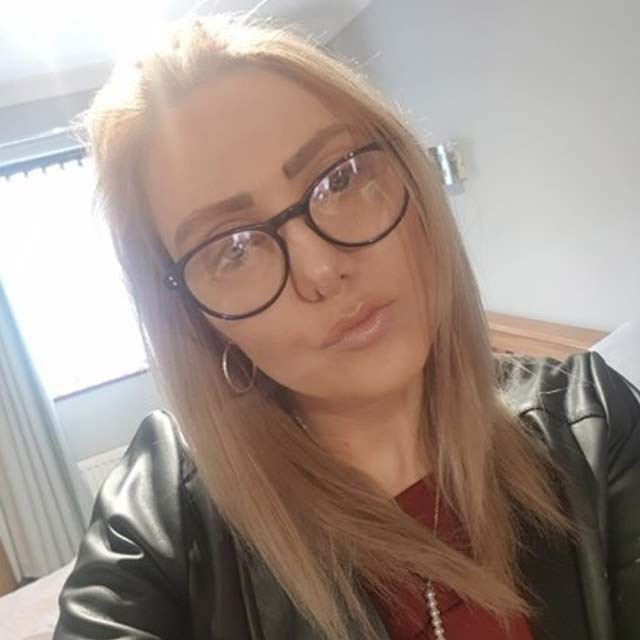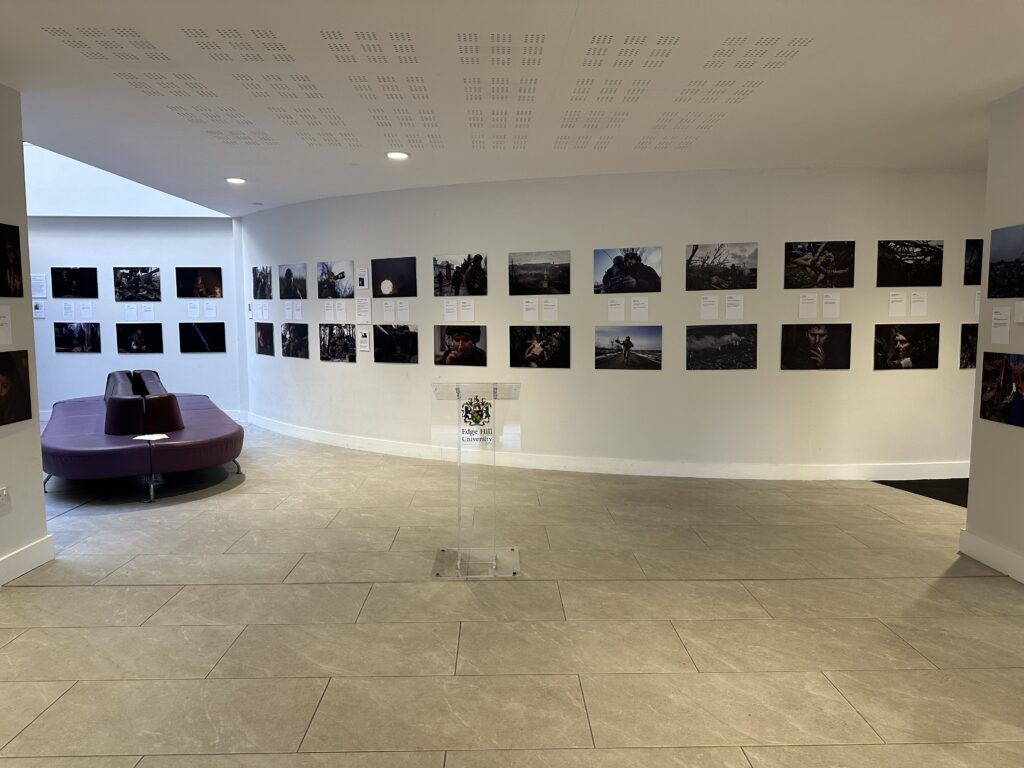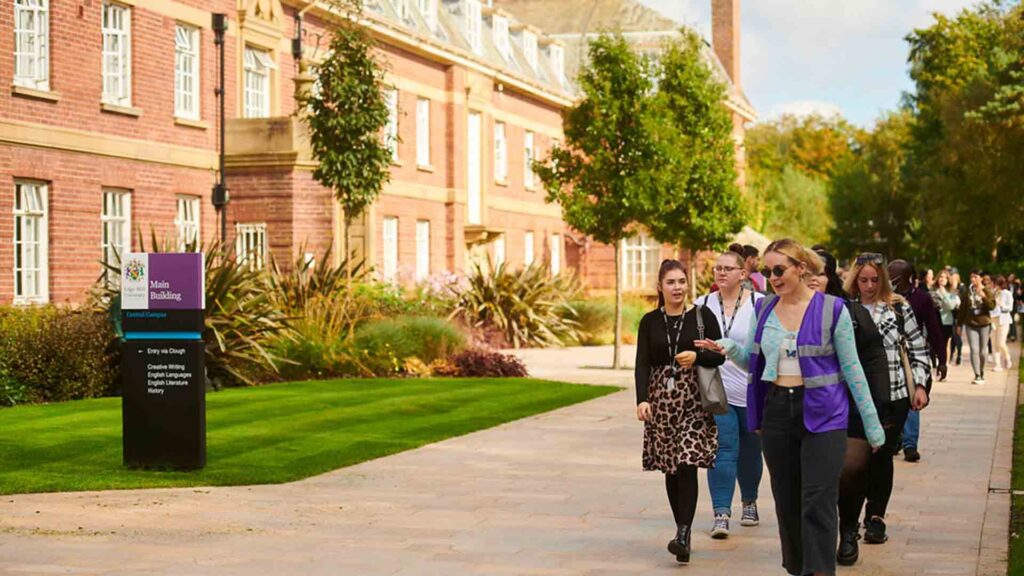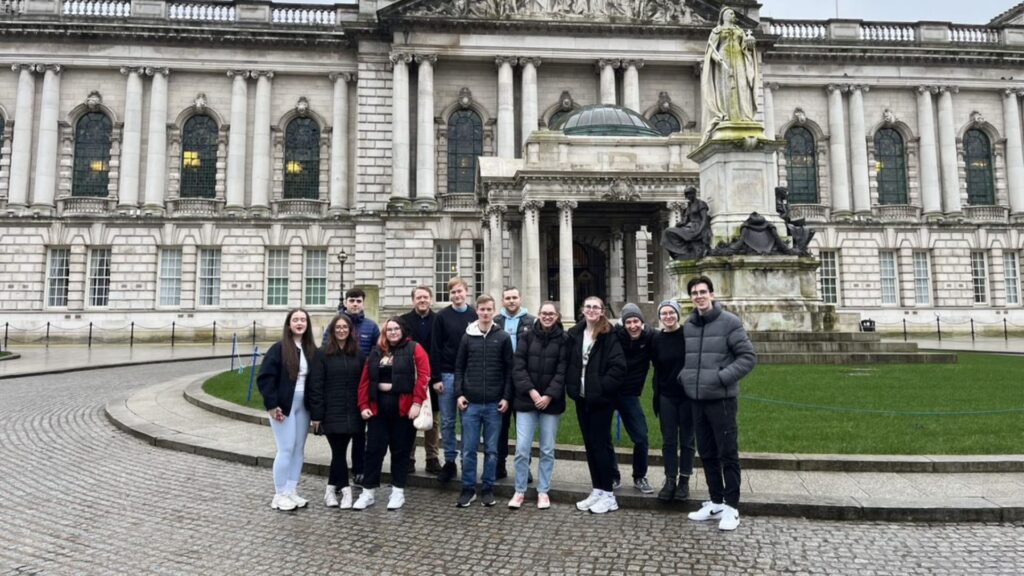
Second year student nurse Leanne decided to take a formative placement, an intense, non-assessed three week opportunity to learn with and about other roles, services and professions within society and communities. It aims to develop our students’ understanding of the wider health and social care agenda.
Leanne worked with the Midlands and Lancashire Commissioning Support Unit (MLCSU). MLCSU supply business support to the NHS, including NHS England and Clinical Commissioning Groups (CCGs) currently in the process of becoming the new Integrated Care Systems (ICSs). Part of this business support looks at data to identify trends, which in turn go towards the development of a framework of resilience to meet the needs of the NHS.

Hi. I’m Leanne, and as a nurse I want to positively impact peoples’ lives. Taking on a formative placement will help me gain as much insight into nursing as possible. This is a diary of my three-week journey with the MLCSU.
Day one
Arriving at MLCSU as a Year 2 student nurse, I was made to feel extremely welcome. After being given my schedule for the next three weeks, I’d already taken an opportunity to read the Care Quality Commission (CQC) report for the Trust, before the upcoming visit this week.
I met my supervisor for the formative placement, who was so accommodating. After being given a guided tour – and a desk – I joined the “daily gold command call” which has been set up to assess the Urgent Care and Emergency Department footfall and ambulance attendances for patients. The data was provided by Trusts, alongside the pressures of staffing, patient numbers and discharges. This builds a picture of how these factors affect an Emergency Department (ED). Then we have the continuing impact of Covid, and the challenges of controlling the infection.
After writing up my notes, I attended a call regarding a case study on a “safety siren” which is being trialled to look at pressures and concerns across the Trusts. This information can be used to further investigate areas of concern, themes and trends to see if strategies can be implemented to decrease mortality rates and improve on care quality for patients. Such a valuable piece of work.
After getting my agenda for the next day, it was time to go home and rest.
Thought for the day: Day one has been informative, and I’ve taken the knowledge that everything has an impact on the patients and the staff working within the NHS, and patient safety is at the heart of everything we do.
Day two
Day two has been challenging in a different way. I needed to read long reports on the two hospitals we’ll visit over the next couple of days.
I needed to look at various NHS England, National Institute of Care and Excellence (NICE) and government policies and procedures within the NHS. Some of these documents highlight discharge pathways and right to reside to look at the flow of the hospitals, details on new and exciting pathways to streamline healthcare, and manage smaller budgets per person in better ways.
I attended the daily gold command meeting and already feel that I understand more than yesterday, which is always a bonus.
I attended a training session on Making Data Count, using and understanding Statistical Process Control (SPC) charts. This will take a while to learn, but once embedded will ensure that I can read, understand, and interpret data in order to make invaluable changes for patients. It’s definitely something I’d encourage other students to look at for their future development.
Thought for the day: The number of abbreviations have been such that I’ve created a glossary to understand the language used. Day two, I feel like you’ve beaten me, and at 20:56pm I feel that it’s time to make the most of my sleep time!
Days three and four
I’ve had to write my blog retrospectively, as both days had a 6am start in order to travel to site locations. The journeys were full of sharing conversations with my supervisor, discussing practice, routines, university, and how practice has changed. We checked over the Key Lines of Enquiry (KLOE), a set of questions based on data and research regarding the trusts admissions, A and E flow, and care, with Discharges and Not Meeting Criteria to Reside (NMC2R) numbers. Sometimes there are numbers presented, but the figures don’t always reflect the real-life changes that are happening in the hospitals. A conversation can help to direct.
The aim of the visit was to capture what’s happened before, during and after the Covid pandemic to impact on the processes, staff and patients. What was implemented? What worked well? What changes could be implemented?
The days were long, only finishing between 7pm and 8pm. I did a lot of walking through the hospital – I endured blisters on my feet one day. However, the insight, the stories and the processes were invaluable. To be able to speak to directors of services and other staff was phenomenal, tapping into the department to understand what was happening in real time to the patients and staff. This exposure to the senior teams has meant that I can see how Trusts operate at board level and the different relationships that are built – and then improved upon – to resolve challenges and implement change.
I had to utilise all my communication skills. I had to watch body language, listen out for key words and phrases, know where open and closed questions were appropriate, and understand the language used and the level of detail people were going into.
I made a ton of notes throughout my days, ensuring that Patient Identifiable Data (PID) was not captured, following confidentiality and governance rules. This was something that would be key to my next few days, and something I’d rely on.
After discussing the key elements both on days one and two, it was home with much needed debriefs in the car, with a view to making plans for the following week.
Thought for the day: These two days have been mentally exhausting, but I wouldn’t complain about the blisters or the exhaustion because the knowledge and opportunity gained is worth it.
Day five
Today has started with exhaustion already. However, the support from my supervisor is exemplary. She has asked me to CHILL… as much as I can, anyway.
A 1:1 meeting has been requested from CSU Midlands, with some sessions for the following week. I answered my emails and got ready… with coffee.
I started with my reflections on the site visit, which I sent across to the Director of Nursing at MLCSU. This highlighted how well the visit went and how I’ll use some of the information and strategies moving forward. This was later returned with some lovely comments from the Director of the MLCSU, which made me feel very proud.
I completed some networking on LinkedIn, to continue building my professional portfolio.
Thought for the day: My blog work is invaluable in helping me to get the most out of my formative placement journey. And remember to CHILL!
Day six
I started my day with coffee at my desk – working from home. Finding motivation for home working is a must, and I find that dressing in office attire as if I’d be attending an office helps create the right mindset.
I’ve started typing up notes for the visit as previously requested by my supervisor. I then attended a Regional Capacity meeting, explaining what the Midlands CSU do as a team, where they obtain their data, and how they use it to ensure the right resourcing and teams are in place, and discuss any ambulance team diverts that need to take place.
I later attended the Regional Capacity team meeting with teams across the Midlands, advising on their positions and what strategies they have / are implemented to maintain the flow of ambulances across the West Midlands, and how they are making patients as comfortable as possible.
I attended the daily gold command calls to see the position of EDs within East Lancashire. The team try and work together to ensure that they have critical care beds available for emergencies.
As the system sees higher acuity patients [patients requiring a greater degree of observation and intervention from nurses] and increased non-Covid and Covid-related nosocomial infections [infections that originate in hospitals], it makes it difficult to control the flow of patients.
Thought for the day: I can see how functioning systems and working as a team can assist in the mutual understanding of each team-member’s role.
Day seven
With fewer calls and tasks in my diary today, I’ve looked over some of my notes from the Regional Capacity team meeting to further understand the terminology and the way in which the East Midlands Ambulance Service works.
I’ve researched frailty and the types of assessments, different categories of ED, and the types of patients that attend, to help my understanding of how the emergency service works and possible prevention measures to reduce acuity. My research has informed my understanding of gold command calls. I can better understand the level of pressure from Trust to Trust, and the results of pressure reduction strategies.
I attended a meeting to discuss what planning was involved in last week’s ED visits, what worked well, what could be improved. Being actively involved, and ensuring I knew the details of the visits inside and out, helped me to participate fully in the meeting.
I caught up with my supervisor, who then sent me data packs. Reading these will help me understand what KLOEs we need to follow when we visit our next hospital Trusts and EDs.
Thought for the day: Being self-managed and having a keen eye for detail appear to be extremely important elements for a role within Commissioning Support.
Day eight
Today I attended a virtual careers fair before joining the gold command room. I got further insight into daily pressures and the consequences of the previous day’s actions.
I looked at the data pack and built a few KLOEs, noting differences within Trusts and EDs, and looking over my previous notes to ensure I was looking at the right types of data. This I found difficult as it’s the first role where I’ve processed such large amounts of data.
A 1:1 meeting discussed other roles involving qualified nurses. This covered the roles of putting quality guidance together for Trusts to ensure a quality service is delivered. For example, frailty teams assess older patients and their frailty to implement proactive strategies and tools to help patients maintain their independence and reduce costs of services.
Thought for the day: After the meeting I received a number of useful documents. It’s really important to read around my role to ensure I close knowledge gaps.
Day nine
I woke at 3am, unwell with an ear infection and in acute pain. I alerted 111 and followed the emergency pathway.
My supervisor advised taking some time off. However, I decided to attend my meeting around on-call training, which covers Senior Manager On Call (SMOC) and Director On Call (DOC), discussing what to do in the event of an incident, the legal frameworks and legislations for managing incidents, and the requirement for an on-call service.
Thought for the day: If I’ve learnt anything it’s that the importance of following the right pathway for emergency care is extremely important.
Day ten
Still unwell and acutely hard of hearing in my right ear. I managed to attend the winter room gold call today where I was able to follow shared ongoing concerns of patients attending ED and bed spaces availability.
I completed some self-directed research on quality standards, care, and treatment reviews and who these apply to, the on-call policy to cement my earlier learning from the on-call training session, and details on emergency preparedness.
I spoke with my supervisor who advised that the current hospital visit schedule had been amended so I no longer needed to prep for this and would be likely to attend a further two visits the following week to a different Trust.
Thought for the day: I found an amazing document: a 15-step challenge, where you can assess a hospital and get a feel for a department within 15 steps. This is prepared by NHS England and is a snapshot of what to look out for on site visits.
Day eleven
I can’t believe it’s my last week already. Still very much unable to hear in my right ear, so this week will be a challenge.
I started my day with the meeting notes for the Clinical Governance Group, followed by a call about applying clinical governance. Teams come together to ensure policies are correct, include the appropriate wording, and signed off by the right department.
This was followed up with reading, ahead of a site visit. The importance of reading the KLOEs and understanding the data is fundamental as it shapes the questions that are asked on visits.
My supervisor sent me the summary from the visits in week one. I nervously pointed out a few spelling errors not picked up in Excel. I suppose the nervousness came from telling someone senior that mistakes have been made. My supervisor was grateful as spell checking in Excel is difficult and she had these changed.
I completed the printing of the documentation in preparation for the visit and then shut down for the evening.
Thought for the day: It’s half-term, and making my children’s lunch and vacuuming gives my head space. The importance of wellbeing while working at home should be – and is – very much a focus. My supervisor actively encourages these breaks and reminds me that I’m not tied to my desk.
Days 12 and 13
Tuesday and Wednesday were site visits. I got up super early to ensure I had my bag packed, pens, notepads etc. Choosing clothing for site visits is important. I have to think, “bare below the elbow” for infection prevention control guidelines. This includes removing my ring, ensuring sleeves are rolled up, washing arms, and using antibacterial gel.
I met the team at the hospital. Being with a new team and a new director meant I was out of my comfort zone. The new team made me feel welcome, putting me at ease and engaging well with me. They could see the value in having a fresh pair of eyes.
We introduced ourselves, gave the reason why we were visiting, and spoke with departments. They were all saying how teams have come together to support each other personally and professionally through Covid.
Covid was a huge focus. It was clear that the innovations implemented during the pandemic had spurred people to push for change within their Trust. Staff were tired, but still moving mountains. I was impressed with that ‘ward to board’ feel, and the repetition of words reflecting quality and quality assurance. ED certainly had challenges, and it felt that no stone was left unturned as they embraced change.
For example, the biopsychosocial model is a holistic approach to health care that recognises how biological, psychological, and social factors work together, and the impact on health if one of these factors is affected. This was evident in the work of a new team that enhanced community working to keep people safe in their own homes and maintain independence.
The team were only too happy to chat about their experiences and backgrounds over lunch.
Discussing the day with a Trust director, he was extremely grateful for the positive feedback and, although he knows there are areas of development, emphasised his team’s priority – to keep people safe.
Thought for the day: Getting home, there was a glass of wine with my name on it, and an episode of something boring on Netflix. The days aren’t always long, but they are certainly very challenging mentally. Taking time to recover feels extremely important in this role.
Day 14
I got up early to attend the office, laptop, lunch and coffee cup packed.
I met my supervisor, and started typing up my notes for the recent visits.
I joined gold command, refreshed my memory with all the terminology used…and could understand it all instantly. I feel it’s embedded already.
Today it hit me that this placement is temporary. It actually feels daunting that this excitement and buzz that I’ve felt working with such a team and family will soon be gone. I bought a small gift to thank my supervisor for their hard work, the effort and time she’s put into the organising – and keeping me organised. She apologised because the planned week had changed so much. However, my take on this is that I’m supposed to go with the flow and adapt accordingly. So this hasn’t bothered me, and I’ve appreciated the training in how to deal with unpredictability.
I joined a call where we celebrated someone’s retirement. Someone kindly pointed out that as one person retires, a new nurse on the call was just starting her career. Me! We’re at opposite ends of our careers, but we both have a similar vision of quality in care.
I suddenly became aware of being in a room with hundreds of years of experience and each of them all valuable.
Thought for the day: Holding back a tear or two, I can certainly say I’m taking the best experience with me. I’ll never forget the people I’ve met and the impact they’ve already made on my career.
Summing up
A huge THANK YOU to MLCSU for my formative placement. This will shape my future when I think about the joined-up community and hospital approach, the early discharge planning, the simplicity of using aseptic techniques and infection control to protect patients and staff. I’ve been so privileged. Once again, thank you!
Reading ahead and understanding policies and procedures has helped me to understand the link between theory and practice, from government publications right through to ward and community, and how these affect patients and staff. Formative placements are for those that are extremely organised, naturally curious, happy to read ahead and gain a greater insight into another side of nursing.
July 27, 2023


